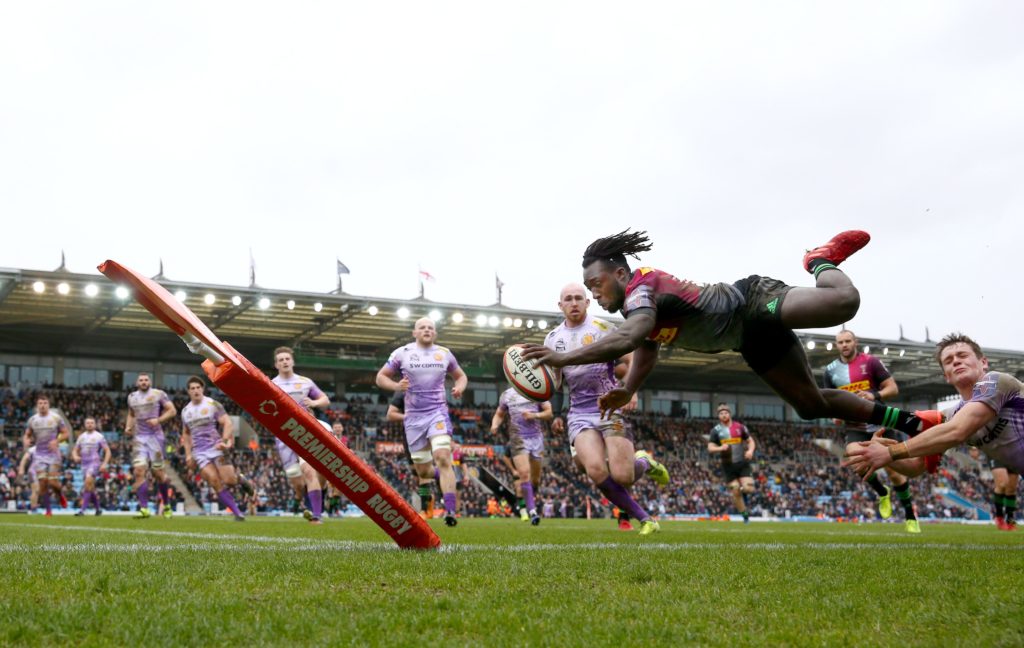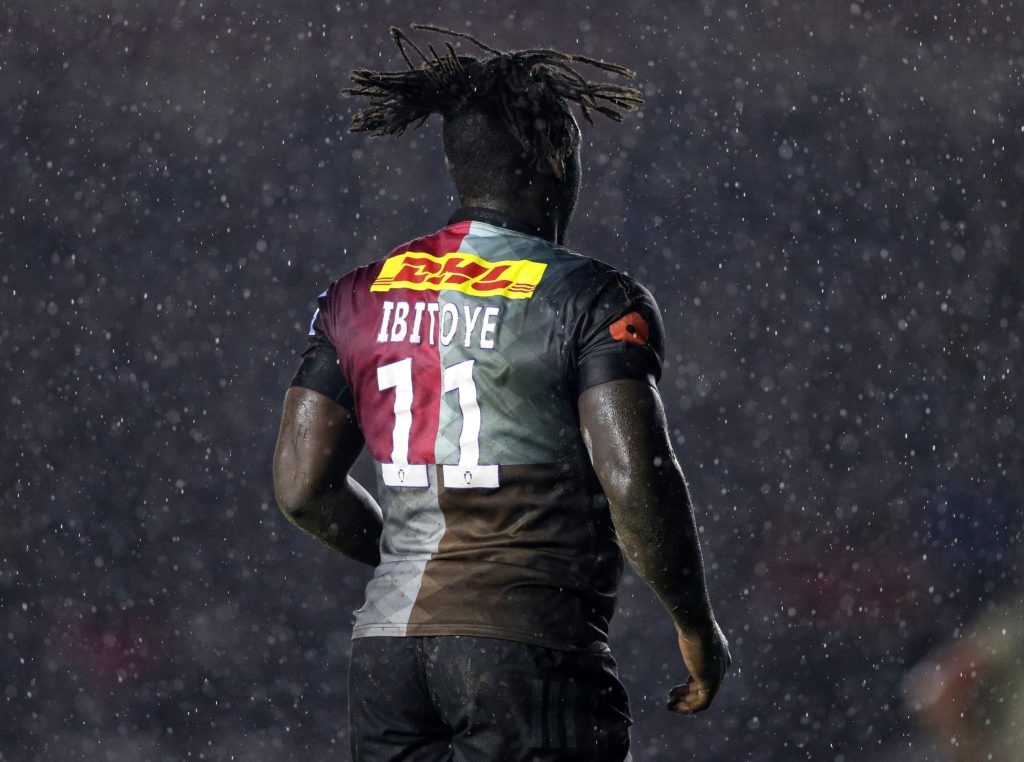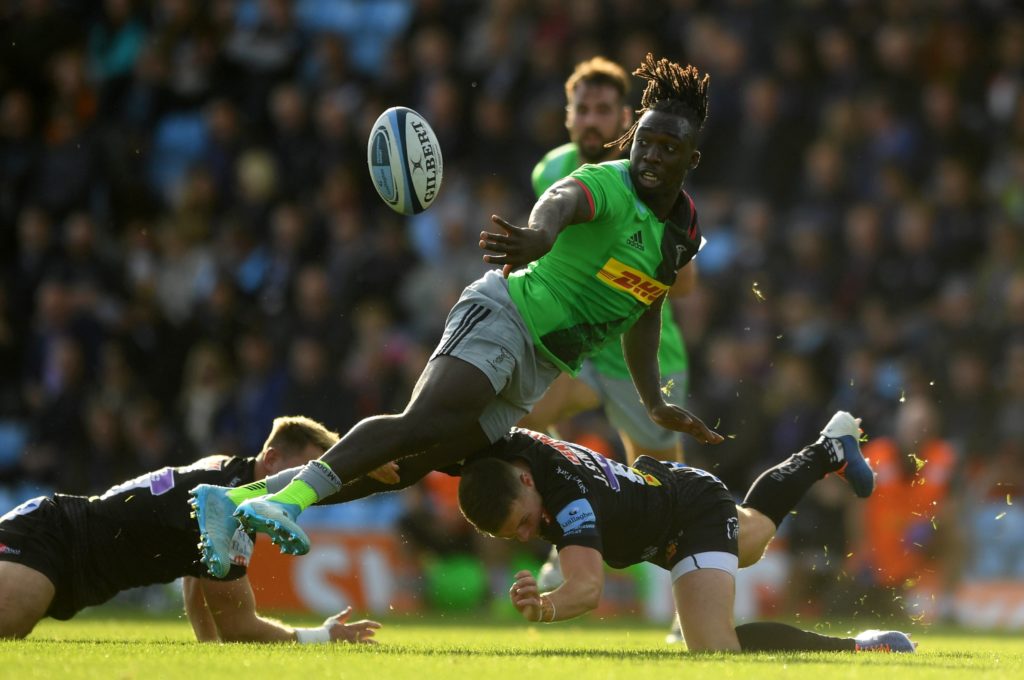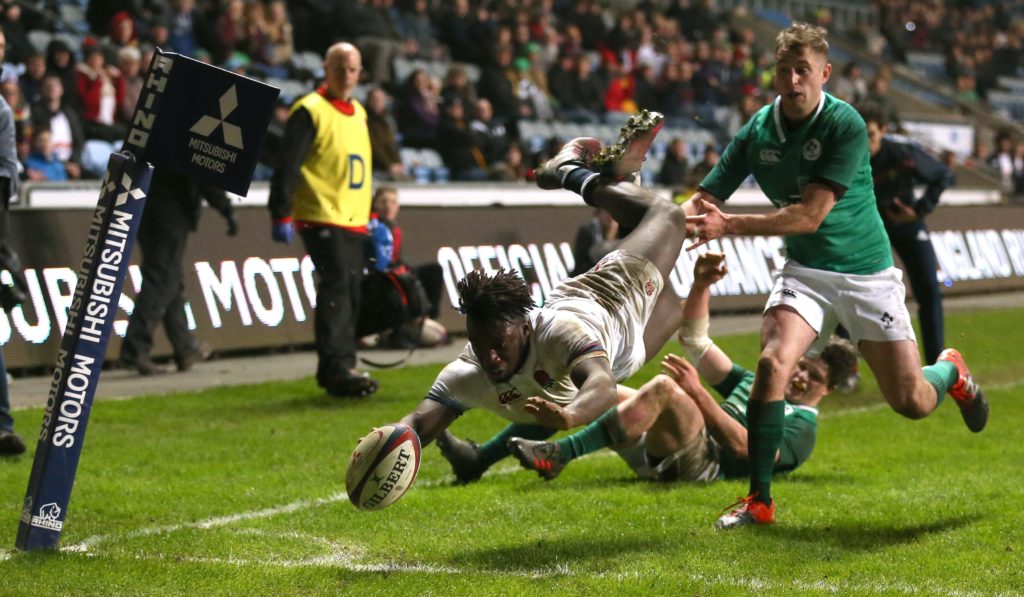For the first five minutes of my interview with Gabriel Ibitoye we talked about Arsenal. We’re both fans although unlike the 22-year-old Agen winger I have a vivid recollection of the last time they won the Premier League in 2004. Since then the Gunners have struggled but there are signs this season that Mikel Arteta is the manager to bring back the glory years. There’s a new generation coming through at the Emirates Stadium, young and exciting English lads, who are well-balanced and talented.
The same could be said of Ibitoye, a young man who’s got his feet on the ground, even if now and again he goes airborne. It was his astonishing acrobatic finish in the corner for England U20 against Australian counterparts in the 2017 World Championship that made the rugby world sit up and take note. The clip went viral, as did one last season when he mesmerised Clermont by doing what can best be described as a ‘Cheslin Kolbe’ in their Champions Cup encounter.
Ibitoye’s got talent but he’s also got a temperament that makes me think he’ll do well in France. Plenty of players from the British Isles haven’t; over the years I’ve become a dab hand at identifying which ones will flourish in France and which ones will fail. I remember a few years ago interviewing an England international who arrived in the Top 14 and, a month in, was moaning about the fact the shops in the south of France close for a siesta. He won’t last long, I told myself, and he didn’t. Nor did the Welsh star who whined about French food.
Ibitoye, in contrast, takes everything in his stride, which is fortunate. Moving to France is a challenge for any Anglophone player, but adapting to a new environment in the middle of a pandemic is particularly daunting. His parents were scheduled to fly out to Agen to watch him in his first Top 14 match at the start of September, but that plan crumbled after Britain introduced a two-week quarantine period for travellers arriving from France. Just as well as Ibitoye isn’t the homesick sort because who knows when he’ll see home again.
“I’ve wanted to play abroad for a while. Having gone through the England age groups I had the opportunity to travel the world, then an opportunity came in France and I grabbed it.
“I’m enjoying it a lot,” he says, reflecting on life in Agen. “The weather has been brilliant, and I’m not someone who makes a fuss, I just get on with it.”
There are a handful of British and Irish players in the Agen squad and they’ve been a great help in easing Ibitoye into the French way of life. “I haven’t been able to start French lessons because of Covid but a lot of the boys at the club speak English, including the coach,” says Ibitoye. “I’m going to make an effort when we do start lessons because learning the language will help me on and off the field.”
In signing for Agen Ibitoye has joined a club in the deep heartland of French rugby. The town is encircled by rivals from all directions: Bayone, Biarritz, Toulouse, Castres, Pau and Brive. Rugby in this corner of France is more than a sport: it’s an identity, a source of fierce pride for towns that, otherwise, would barely register on the nation’s consciousness. Agen, for example, has a population of just 33,000, yet its rugby club has put it on the map. “It’s a small town and very passionate about their rugby so it’s hard to go unnoticed,” says Ibitoye.

It’s a long way from Lambeth, geographically and culturally. In that part of south London football is king although Ibitoye shunned local clubs such as Chelsea, West Ham and Millwall and pledged his allegiance to Arsenal because of a certain Thierry Henry.
Football was Ibitoye’s sport as a youngster and aged 11, he won a soccer scholarship to Trinity College in Croydon, a prestigious private school with outstanding facilities. Suddenly Ibitoye was able to play sports he’d only seen on TV and rugby was the one for which he was most suited.
At 13 he was signed up to Harlequins’ development programme and at 15 he was playing for England U16s. The rise up the representative ladder continued with the U18s and U20s, and in February 2018 he was invited to train with the senior England squad. The 19-year-old had a decision to make: he couldn’t combine professional rugby with his degree in mathematics so he put his university course on hold and concentrated on sport.
It’s a loss less structured [in France], players can create something out of nothing and it highlights individual brilliance, so I think French rugby is more suited to me.
Two years later he made another bold call, this time signing for Agen. “I’ve wanted to play abroad for a while,” he says. “Having gone through the England age groups I had the opportunity to travel the world. I saw a lot of different styles and I thought ‘I need to get out there’. Then an opportunity came in France and I grabbed it. Rugby can be a short career and you never know what’s going to happen next.”
One of the most successful English players in France is Nick Abendanon, who with Clermont won a Top 14 title and played in a Champions Cup final. A student of the game, Abendanon told me not long after his arrival in France that he’d watched a lot of Top 14 matches while at Bath and identified how it was suited to a player of his speed and agility. French packs are bigger than their English rivals, but slower round the pitch, leaving space for the more fleet of foot. “I saw that, too,” says Ibitoye when I tell him about Abendanon. “The way French teams play…it’s not loose, it’s heads up rugby. The forwards are so direct they’re just sucking defenders in and allowing the wide players to run around.

“English rugby, in my opinion, is more structured. Here, when I get the ball, I look up and think ‘okay, what are these defenders doing and how do I beat them?’ The primary job of outside backs is to beat defenders and get the team going forward…because it’s a lot less structured [in France] players can create something out of nothing and it highlights individual brilliance. That’s what I need to try and improve in my game. So I think French rugby is more suited to me.”
In his Top 14 debut against Castres on September 5 Ibitoye scored two tries, the second of which showcased his razor sharp finishing skills. The French media went wild. L’Equipe ran a “Five Things to Know” piece about the “future star of world rugby” and Midi Olympique gave him a half-page splash under the headline ‘Who are you?’. In attempting to enlighten its readers, the paper described him as a “human bomb” and noted that the young Englishman had scored 11 tries in 17 appearances for England U20 and ten in 21 games for Quins last season.
He’s been compared to Rupeni Caucaunibuca, the Fijian winger who scored 65 tries for Agen in six colourful seasons, and things began to get out of hand when he was likened to Jonah Lomu.
Of course, it makes me happy in a way that they think I’m good but let’s hold on a minute, everyone relax, I’m not Lomu and I’m not Rupeni!”
Ibitoye laughs at what he calls the “weirdness” of the excitement he’s generated. For a start, at 5ft 8in and 14st 9lbs he’s more Kolbe than Lomu, and he’s keen to stress that he’s still a rugby rookie learning the ropes. “When I look at what I’ve done in my career, I’ve had a decent start but it’s not been a ridiculous start,” he says. “I’m not an international and they’re comparing me to these ‘Hall of Fame’ guys, some of the best wingers ever. I’m only 22 and I have a lot to work on in my game. Of course, it makes me happy in a way that they think I’m good but let’s hold on a minute, everyone relax, I’m not Lomu and I’m not Rupeni!”
If his defence is what needs most work, his strength is his finishing. He’s a natural, as he showed with that stunning touchdown against Australia U20, but Ibitoye strives for perfection. “I’m someone who learns by watching things,” says Ibitoye. “I watch lots of clips of rugby league players finishing in corners and their finishes are ridiculous. It seems that they know what they’re going to do as soon as they get the ball. So I work on that, trying to stay calm and dotting down in the corner.”

Not surprisingly for a mathematician, Ibitoye isn’t adverse to calculations so when Agen made their approach he worked out his chances of playing for England in the immediate future. “It wasn’t a tough decision to make, to be honest,” he explains. “This current England team have a fantastic back three and I’d be lying to myself if I said I was as good as them. I think this move will accelerate my development and then hopefully in a few years’ time I’ll be at that level.
“I made the decision myself. If I’d been in contention many conversations [with Eddie Jones] would have been had but I knew I didn’t have to have those conversations because I’m not there.”
This current England team have a fantastic back three and I’d be lying to myself if I said I was as good as them. Hopefully in a few years’ time I’ll be at that level.
Ibitoye has signed a two-year deal with Agen, and in a perfect world he would return to England in the summer of 2022 and the following year score the winning try for his country in the 2023 World Cup.
But the world isn’t perfect, so who knows what might happen. Who could ever have imagined, for example, at the start of this year that professional rugby would go into a six month hibernation and emerge blinking and befuddled into a new world where clubs and unions are now fighting for survival.

Ibitoye is also worried what the impact of coronavirus will be on Project Rugby, an initiative launched jointly in 2017 by England Rugby and Premiership Rugby. Its aim is to boost participation in the sport by young people from traditionally under-represented groups, and Ibitoye has done his bit to help the Project over the years. “The pandemic is going to have an effect and we have to act quickly because we won’t see the effects now but down the line in a year or two,” he says. “There will be kids who haven’t been able to play competitive sport at their age group, and so they’ve missed out on the grassroots stage.”
The longer that Project Rugby is prevented from taking its message around the country, the more damage will be done in broadening the sport’s appeal. “In my experience state schools tend to focus more on football, and it’s just easier to play and coach football for kids,” says Ibitoye. “Will rugby still be successful in attracting people from lower socio-economic backgrounds?”
It’s one of many difficult questions facing rugby in the most traumatic year in its history. With so much uncertainty around it’s a challenge for the players to stay focused but that is what Ibitoye is doing in France. Like his beloved Arsenal, he’s a work in progress, but the potential for greatness is evident.



Comments
Join free and tell us what you really think!
Sign up for free